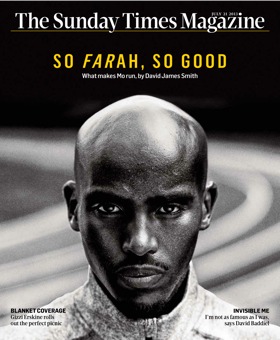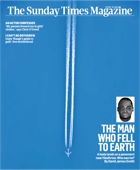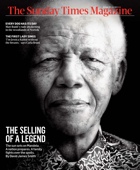Everyday Stories Of Small Town Racism
October 11, 2010
Two months ago I wrote an article which appeared as the cover story in The Sunday Times Magazine about my family’s experiences of racism since moving to Lewes. The article created some controversy and continues to have reverberations. On Saturday afternoon, for instance, the town Library hosted the first ever Black History Month event in Lewes. It was really quite a thrilling occasion, vibrant with music, storytelling and performance poetry from local representatives of the African diaspora.
There is a modern argument that Black History Month is kind of patronising to black people and black history should no longer be a separate entity but integrated into the mainstream history curriculum. That might be a viable point of view in cities with a substantial BME population, but in Lewes – and elsewhere of course – the need is still great.
By way of illustration, Lewes is proud, I think, to count among its residents two world renowned poets whose work features on the GCSE curriculum. John Agard and Grace Nichols moved to the UK from Guyana more than three decades ago and have lived in Lewes for the majority of the years since. They have published a considerable volume of work, very little of which, until last week, appeared on the shelves of the local library. They were almost nowhere to be seen.
Naturally, our two great living poets were the centre piece of Saturday’s event, and as they performed their work the large crowd that was listening could have spotted ample fresh copies of their books displayed on the nearby shelves, along with an impressive new stock of books by other black British and Afro-Caribbean writers and authors from the wider Commonwealth. There, straightaway, was one was positive impact of the Black History Month group of Lewes event (and, in turn of my article which brought the group together in the first place).
There is no doubt that Grace Nichols and John Agard found a ready welcome in Lewes and I know they are happy here. Black people do not of course have a homogeneity of attitudes towards racism. But even those who do not feel they are regularly confronted with it themselves would be reluctanct to deny its existence.
My article, in the final cut, reflected only my own family’s experiences. In its original draft it had included many of the more overt examples of racism experienced by some of the 10 other black, asian and mixed race Lewes couples I interviewed during the research. The original draft was way too long and needed to be cut, so I agreed with my editor to pare it back to my own family’s story. I figured this would make the article plainer and easier to follow. I also wanted to make people aware that not all racism involves blatant acts, but can be subtle and disguised and no less affecting for being unintended or born of ignorance. I felt too that focusing on my family would protect the others from the abuse that was bound to follow, and of course did. I could see people in blogs and forums asking out loud what some of the other local black people, who they named would make of my article. Little did they know those other black people had experienced racism too and didn’t mind saying so and had read and supported my article ahead of publication. I had circulated it widely, keen to ensure it accurately reflected the experiences of others.
Not all of the others were happy to be left out of the article. Some felt it would have been stronger – and harder to attack or undermine – if it had included their experiences too. Certainly some of the stories were painful or sad or hair-raising, in some cases all three at once. I will not identify the people here, even though they were all willing to be identified in the original article, all except the couple in this story, a mixed race family, one black parent, one not, who sent a child to a local school where, at the age of six, she was excluded by a group of friends who formed ‘the white club’ and said she could not be in it as she was not white. The girl was very distressed and so too were the parents. The school and the parents of the other children all at first refused to accept it was an issue of race, and instead said it was a friendship issue. It was certainly an issue of race and identity for the excluded girl who started saying she hated her colour and hoped she would grow out of it, get white skin as she grew older. In desperation the couple got support from a Brighton organisation Mosaic who sent them back to the school with a lawyer. The school, and the other parents, changed their tune, accepted the problem for what it was, and introduced some diversity teaching into the curriculum. The child recovered and is now happy in her own skin and in the school.
Someone not always happy in his own skin is a local man of African origin who has lived here many years and has soaked up an endless succession of ignorant and racist remarks as he goes about his business in the town. People admire his ‘tan’ and wish they had one like it themselves, make jokes about him being ‘invisible’ in the dark and so on and on. He doesn’t like it but nor does he want to spend his life challenging racism.
Another African resident did not like it when her parents came over from her home country to stay with her, for the first time. Welcome to Lewes. Her father, an elderly man, was picked up by the police outside a local primary school after a parent reported a suspicous looking man hanging around. He was in fact merely passing the school on his way to the Downs to keep up his lifetime habit of running to stay fit. It looked very much as if the only thing suspicious about the man was the fact that he was black. He and his wife and their daughter all felt humiliated and angered by the indignity he had faced, being searched in the street before put in a police car and taken to his daughter’s home.
An Asian man who had grown up in London in the 1970s in an area of racial unrest thought he had left all that behind when he moved to Lewes. Instead on two occasions he was openly abused in the town centre, once as a ‘fucking Paki’. When he reported the incidents in a local newsletter someone suggested it could have been outsiders who had abused him. I noticed that same argument used in a recent comment on the Lewes forum, in relation to a post by someone who said they had left Lewes to escape the racism. Another poster responded with some racist abuse, no doubt reminding the man why he had left in the first place.
The point of these stories – and there are many more – is not to condemn the whole of Lewes as racist but to say, look, these things go on here as much as anywhere else. Lewes is not without racism and denying it only serves to support and perpetuate racist values and ignorance.
Lewes is not unlike many other places in this respect, but there are ways in which it is really rather unique. One of the singular aspects of Lewes is that the black people who live there are not the only people going around in black skin: once a year, during the November 5th celebrations, some white members of one of the bonfire societies get blacked up and parade through the streets dressed as zulus. They pride themselves on the detail and authenticity and pageantry of their costumes, but seem unaware of their capacity to cause offence.
Not one of the people I interviewed for my article thought it was all right for white people to get blacked up in this day and age. The cultural associations – slavery, imperialism, ‘nigger minstrels’, ‘coon singers’, apartheid – are hard to ignore.
I believe that one of the oldest zulus has been in the bonfire society since he was a child, when he used to form part of a tableau which required him to sit as a white boy in a pot with cardboard flames surrounded by family and friends blacked up as cannibals cooking him to eat. You don’t hear about that in the proud histories of Lewes bonfire.





